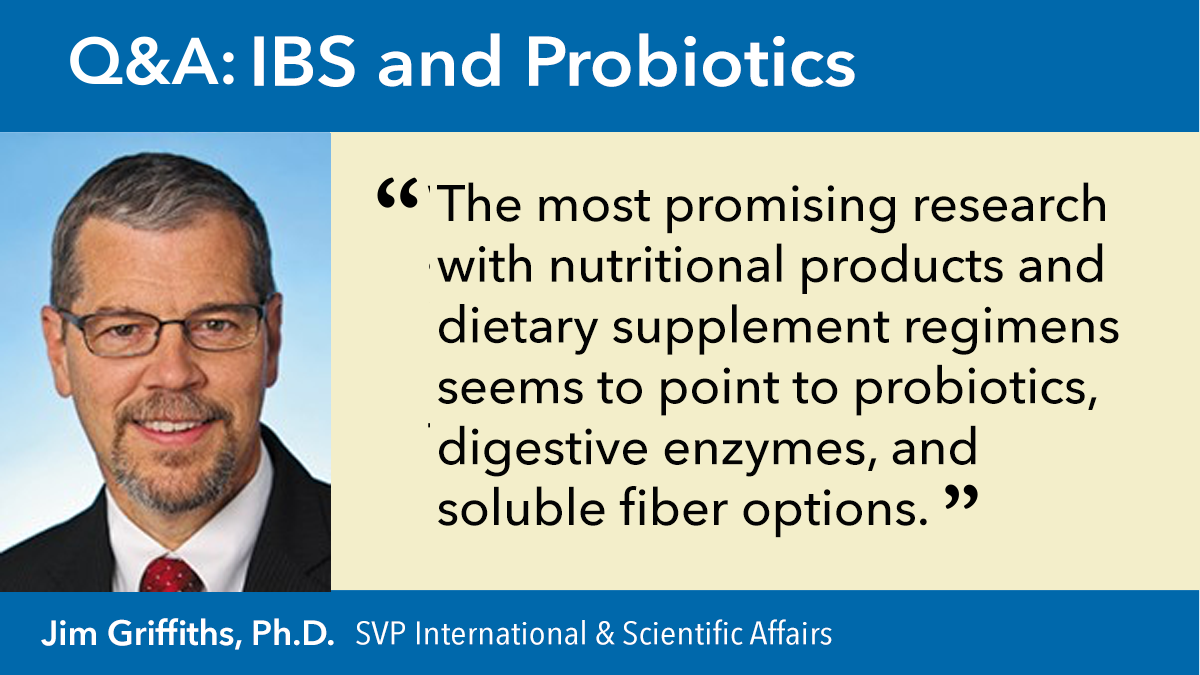Q&A with CRN's Jim Griffiths, Ph.D.
Jim Griffiths, Ph.D., CRN Senior Vice President, Scientific and International Affairs, sat down to discuss irritable bowel syndrome (IBS) and share which dietary supplements may be helpful to those afflicted with the disorder. The International Foundation for Gastrointestinal Disorders (IFFGD) designated April as IBS Awareness Month in 1997.

Q: What is IBS and what causes it?
A: These days most people have heard of irritable bowel syndrome (IBS). It is a fairly common, sometimes serious, functional disorder of the gut, characterized by several symptoms, including abdominal pain, bloating and distension; and some abnormality of bowel habits, such as frequency and consistency. Although many theories have been proposed, the definitive cause of IBS has not been determined. The IFFGD website is a great resource and provides comprehensive information on what it is and its causes.
Q: Are certain age groups or populations more susceptible to suffer from IBS?
A: That’s a good question. So, according to Harvard Health, it affects approximately 1 out of 10 people in the United States each year, and when diagnosed in a primary care setting, is responsible for up to 40 percent of referrals to gastroenterologists. It is more often diagnosed in women than in men. Children are most at risk for IBS if one or both parents have the disorder, and teenagers are more at risk than younger children.
Q: Can IBS be improved or eliminated by making changes to one’s diet?
A: Yes, dietary changes are among the most effective options for managing IBS. For example, avoidance of dairy products, such as milk, yogurts and soft cheeses. There is a long list of common fruits and vegetables that some sufferers avoid, everything from apples and cherries to broccoli and onions. Those that exacerbate IBS symptoms should be reduced or eliminated from one’s diet. Additionally, some sufferers abstain from artificial sweeteners xylitol, sorbitol and mannitol and from products containing soy. There is good news, however. For some sufferers, IBS can be managed by consuming lactose-free or almond milks, and hard cheeses. Other foods that have shown benefit are bananas, strawberries and oranges. Others that make the ‘good’ list include cucumbers, potatoes, lettuce, beef, fish, eggs, almonds, peanuts, walnuts, oats, corn and quinoa.
Q: What supplements are most beneficial in helping to address IBS?
A: That’s the other bit of good news. There are supplements that can help. According to Hong and fellow researchers, the most promising research with nutritional products and dietary supplement regimens seems to point to probiotics, digestive enzymes, and soluble fiber options. Also, research is focused on several botanicals, such as aloe vera.
Q: What are probiotics and how do they work?
A: Probiotics are living microorganisms that are nonpathogenic to the host. They are known to produce several beneficial effects, such as lowering the growth of pathogenic organisms via competition and altering the host's GI immune system. Lactobacillus, bifidobacterium, and saccharomyces strains are most often used and can be consumed in the form of food or dietary supplements. The adverse events (if any) associated with probiotics are found to be safer in comparison to pharmaceutics, and have been shown to improve overall stool frequency, gut transit time, and stool consistency.
Probiotics: The big picture
Learn about probiotic supplements and how they can improve quality of life and reduce loss of productivity associated with IBS in the CRN Foundation's Supplements to Savings report's chapter on "Probiotics, Irritable Bowel Syndrome and Productivity." The chapter discusses the impact of IBS both financially and in terms of reduced quality of life, and includes a scientific literature review as well as an analysis of the economic implications with detailed data.


